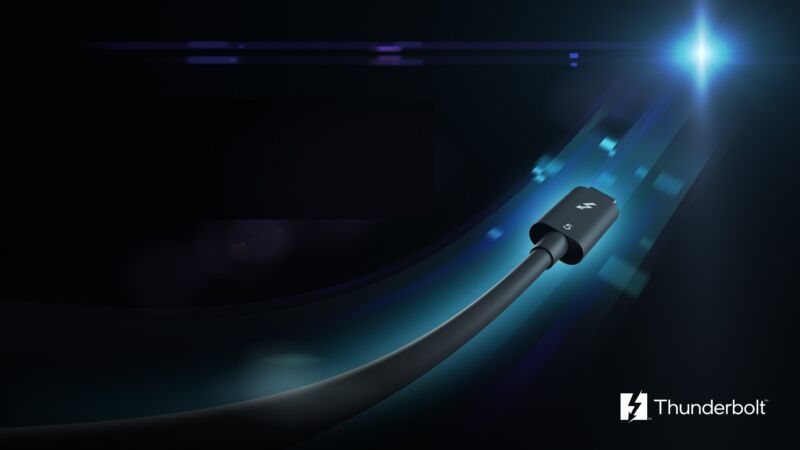
Intel
Intel this week announced new Thunderbolt software made for connecting two PCs. Thunderbolt Share will require Intel-licensed hardware and is looking to make it simpler to do things like transferring large files from one PC to another or working with two systems simultaneously.
For example, you could use a Thunderbolt cable to connect one laptop to another and then configure the system so that your keyboard, mouse, and monitor work with both computers. Thunderbolt Share also enables dragging and dropping and syncing files between computers.
The app has similar functionality to a KVM switch or apps like PCmover, Logitech Flow, or macOS’ File Sharing and Screen Sharing, which enable wireless file sharing. But Thunderbolt Share comes with Intel-backed Thunderbolt 4 or Thunderbolt 5 speeds (depending on the hardware) and some critical requirements.
In a press briefing, Jason Ziller, VP and GM of Intel’s Client Connectivity Division, said that the speeds would vary by what the user is doing.
“It’s hard to put a number on it,” he said. “But I’d say, generally speaking, probably expect to see around 20 gigabits per second… That’s on a Thunderbolt 4 on a 40 gig link. And then we’ll see higher bandwidth on Thunderbolt 5 [with an] 80 gig link.”
You could use Thunderbolt Share to connect a laptop to a desktop so they can share a monitor, mouse, and keyboard, for example. The systems could also connect via a Thunderbolt dock or Thunderbolt monitor. Ziller told the press that the feature could support FHD screen mirroring at up to 60 frames per second (fps), and higher resolutions would result in lower frame rates.
Per Ziller, the feature could pull some CPU and GPU resources depending on the workload and hardware involved. Full video mirroring, for example, would be a more taxing task. Ziller said.
Thunderbolt Share requires Windows 10 or newer to work, but Intel is “exploring” additional OS support for the future, Ziller told the press.
New hardware required
You might be thinking, “Great! I have a Thunderbolt 4 desktop and laptop I’d love to connect right now.” But no hardware you own will officially support Thunderbolt Share, as it requires Intel licensing, which will cost OEMs an extra fee. That means you’ll need a new computer or dock, which Intel says will start releasing this year. Thunderbolt Share will not be part of the Thunderbolt 5 spec, either.
When Ars Technica asked about this limitation, Intel spokesperson Tom Hannaford said, “We focused on partnering with the OEMs to test, validate, and provide support to ensure all new Thunderbolt Share-enabled PCs and accessories meet the performance and quality standards that users expect with Thunderbolt technology. Working with our OEM partners in this way to bring Thunderbolt Share to market will ensure the best possible multi-PC experience for creators, gamers, consumers, and businesses.”
Partners announced this week include Acer, Lenovo, MSI, Razer, Belkin, Kensington, and Plugable, and Intel says there will be more.
“Thunderbolt Share is a more advanced experience than what the baseline Thunderbolt spec should require,” Hannaford said. “That’s why we’re offering it as a value-add feature that OEMs can license for supported hardware going forward rather than requiring they license it as part of the base Thunderbolt spec.”
The Verge reported that Thunderbolt Share “doesn’t strictly require a Thunderbolt-certified computer” or Intel CPU. Ziller told the publication that USB4 and Thunderbolt 3 connections “may work, we just really don’t guarantee it; we won’t be providing support for it.”
Intel’s portrayal of Thunderbolt Share as something that needs rigid testing aligns with the company’s general approach to Thunderbolt. Still, I was able to use a preproduction version of the app without licensed hardware. Using a Thunderbolt 4 cable, the app seemed to work normally, and I moved a 1GB folder with Word documents and some images in about a minute and 15 seconds. Your experience may vary, though. Further, some Macs can link up over a Thunderbolt cable and share files and screens without licensing from Intel.
The test version of Thunderbolt Share is temporary, though. Those who want to use the officially supported final version will have to wait until the app’s release in June. You’ll also need a licensed third-party PC or dock to become available.
